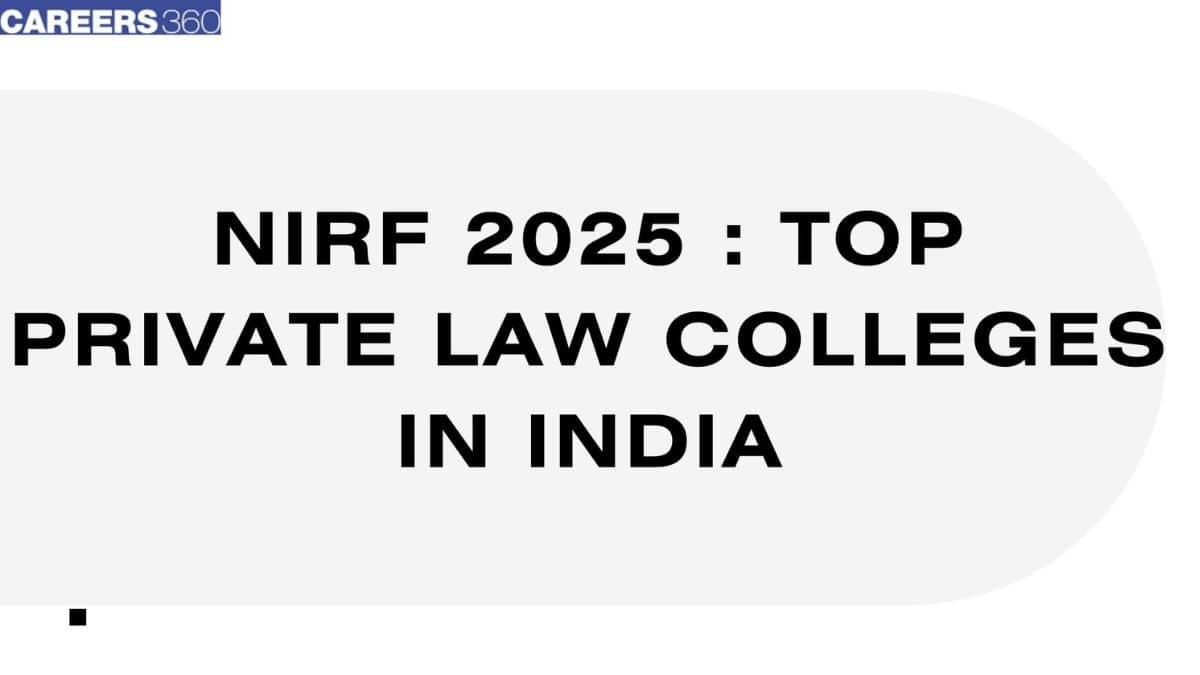Jindal Global Law School Admissions 2026
Ranked #1 Law School in India & South Asia by QS- World University Rankings | Merit cum means scholarships | Early Admissions (Pahse 2) Deadline: 28th Feb’26
The Ministry of Education (MoE) published the National Institute Research Framework (NIRF) 2025 rankings for law schools on September 4, 2025. As per the latest NIRF Law rankings 2025, two private law schools made it into the top 10 list. Symbiosis Law School (SLS) Pune secured the 7th rank, emerging as the top private law college in India, while Siksha O Anusadhan (SOA) was ranked in the 10th spot. SRM Institute of Science & Tech, Nirma University and Galgotias University are new entrants among the list of private law colleges in the NIRF 2025 Law ranking.

Last year, only 11 private law colleges made it to the NIRF rankings; however, this year the number has improved to 16 private law schools. Also, Tamil Nadu dominated with the highest number of top-NIRF-ranked private law colleges in India, showcasing its growth in the legal education field. The NIRF Law rankings are released based on five parameters - Teaching, Learning & Resources, Research and Professional Practice, Graduation Outcomes, Outreach and Inclusivity, and Perception. Candidates wishing to pursue undergraduate and postgraduate law courses, such as 5-year integrated BA LLB, BBA LLB, BCom LLB, 3-year LLB, and LLM can use the NIRF law colleges ranking to identify and select the top private law colleges. Read the complete article to check the details about the NIRF private law colleges ranking 2025 here.
Name | City | State | Rank 2025 | Score 2025 | Status |
Pune | Maharashtra | 7 | 74.07 | Private | |
Bhubaneswar | Odisha | 10 | 65.36 | Private | |
Thanjavur | Tamil Nadu | 11 | 65.29 | Private | |
| Kalinga Institute of Industrial Technology (KIIT) | Bhubaneswar | Odisha | 14 | 65.04 | Private |
Chennai | Tamil Nadu | 19 | 60.9 | Private | |
Bengaluru | Karnataka | 20 | 60.83 | Private | |
Dehradun | Uttarakhand | 18 | 61.45 | Private | |
Bengaluru | Karnataka | 24 | 58.4 | Private | |
Chennai | Tamil Nadu | 25 | 58 | NEW (Private) | |
Phagwara | Punjab | 26 | 57.98 | Private | |
Jaipur | Rajasthan | 32 | 54.83 | Private | |
Ahmedabad | Gujarat | 33 | 53.7 | NEW (Private) | |
Gautam Budh Nagar | Uttar Pradesh | 36 | 53.33 | NEW (Private) | |
Mohali | Punjab | 37 | 53.27 | Private (Army Category) | |
Visakhapatnam | Andhra Pradesh | 38 | 53.26 | Private | |
Gurugram | Haryana | 39 | 53.22 | Private |
CLAT: The Common Law Admission Test (CLAT) is conducted by the Consortium of National Law Universities. At present, over 60 private colleges are affiliated with the CLAT. Through these exams, candidates can enrol on 5-year LLB and LLM programmes.
SLAT: The Symbiosis Law Admission Test (SLAT) is conducted by Symbiosis International (Deemed University) for admission into 5-year LLB programmes of the four Symbiosis Law Schools namely SLS Pune, SLS Noida, SLS Nagpur, and SLS Hyderabad.
CUET: The Common University Entrance Test Law is conducted by the National Testing Agency. Through this exam, candidates can get admission into UG, and PG law programmes of private universities that accept CUET scores.
Ranked #1 Law School in India & South Asia by QS- World University Rankings | Merit cum means scholarships | Early Admissions (Pahse 2) Deadline: 28th Feb’26
Among top 100 Universities Globally in the Times Higher Education (THE) Interdisciplinary Science Rankings 2026
On Question asked by student community
Hi, you can apply for admissions in Nirma University, NFSU Ahemdabad, Alliance, IPU University and affiliated instiutes (in case you are reserved category candidates), UPES Dehradun, BITS Law School etc.
Start preparing for CLAT by first understanding the exam pattern and syllabus, which includes English, Current Affairs, Legal Reasoning, Logical Reasoning, and Quantitative Techniques. Make a simple daily routine and begin with basics read newspapers regularly for current affairs, practice comprehension passages for English and legal sections, and solve basic
Hello,
With a CLAT AIR of 33599 and SC category rank of 2103, and being a Delhi domicile, your chances at IP University (GGSIPU) are moderate to good, especially in later counselling rounds.
Based on previous year trends, some IPU-affiliated law colleges have closed at higher SC category ranks, so
Hello,
The counselling and seat allotment process for CLAT 2026 has already begun and with seats reserved for various categories including OBCs
They have not separately released the list for OBC for Lucknow NLU , they releases a round wise allotment list and allot them seats according to their rank.
Hello
With an AIR of 9076 and EWS rank of 846 in CLAT 2026, getting a top NLUs is unlikely, which is why you didn’t get a seat in the first round. However, you still have some chances in lower-tier NLUs like NLU Odisha, NLU Assam, NLU Tripura, NLU Meghalaya,
Among top 100 Universities Globally in the Times Higher Education (THE) Interdisciplinary Science Rankings 2026
NAAC A+ Accredited | Among top 2% Universities Globally (QS World University Rankings 2026)
Excellent curriculum; an impressive range of electives, besides core law courses. Up to 100% merit scholarship on a first-come, first-served basis
Moot Court | Mock trials | Legal Aid Clinic
Admissions open for B.A. LL.B. (Hons.), B.B.A. LL.B. (Hons.) and LL.B Program (3 Years) | School of Law, MRU ranked No. 1 in Law Schools of Excellence in India by GHRDC (2023)
NAAC A++ Accredited | Ranked #11 by NIRF